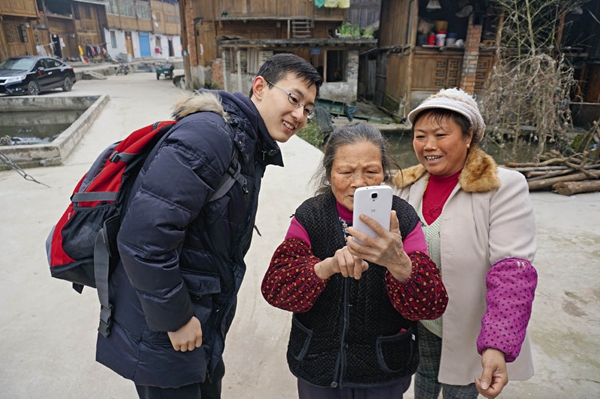By staff reporter GONG HAN


By staff reporter GONG HAN
SINCE its launch in August 2015, We Country has signed up more than 900 villages around China. We Country is a platform developed by Chinese Internet giant Tencent, offering rural communities technical assistance to help them get the most out of their smart phones. It is widely seen as an extensive trial of using mobile Internet to transform rural China.
Combating Cattle Theft with Wechat
Tongguan Village, Liping County was We Country’s first test-site. It is a five-hour drive from Guiyang, the capital of Guizhou Province – four hours on the expressway followed by one hour on a rugged mountain trail.
In this community of around 400 households, more than 90 percent are of the Dong ethnic minority. Like many other Chinese villages, most of the young people are away working better-paid jobs in the city. Their aging parents and young children are left to tend the fields, each earning a meagre average annual income of RMB 2,600.
Tencent started its charitable campaign in Guizhou and neighboring Yunnan Province back in 2009, with donations and educational assistance. During the course of the campaign, Chen Yuanyuan, social responsibility manager for Tencent, quickly noticed a common problem affecting rural communities – that rural residents were very disconnected, without access to many modern developments including the circulation of information, wealth creation, and emotional growth. She realized that what would help these residents most was not donations of cash or assistance, but an increase in their ability to connect.
Before the advent of mobile Internet, it was impossible to proliferate Internet connection in the countryside due to the prohibitive cost of equipment and the scale of training needed. Mobile Internet has made it possible to close the urban-rural digital gap.

A young villager teaches an elderly resident how to use smartphones.
When Tencent launched their trial program in Tongguan, less than 15 percent of its residents owned smart phones. First, Chen Yuanyuan and her colleagues secured a donation of handsets from ZTE, got funding from China Mobile to set up 4G base stations in the region, and free Internet access provided by Guizhou Mobile. They then taught local residents how to use smart phones and the Internet, including elderly people who were illiterate.
One female resident received a white smart phone, replacing her ancient model with a black and white screen which she had been doggedly using to save money. Now with free Internet access, she has learned how to surf the web and has installed WeChat, the Tencent messaging app that has more than 800 million registered active users. The woman’s daughter was her first WeChat friend. Whenever the two weren’t talking, she could text her daughter to tell her to come down for lunch. She later extended the connection to include fellow members of the village choir of which she is chairwoman, so that she could more easily distribute notices, exchange information and dispense payments for performances. When a BBC reporting team came to the village to film a documentary in April 2015, she took a selfie with the dashing British presenter and posted it on WeChat.
Elderly villagers also embraced their smartphones with great gusto after mastering the video call function which allowed them to have face-to-face talks with their children who live and work out of town.
Tongguan was also the first rural community in China to open a public WeChat account. The village committee uses this digital platform to notify people of public affairs up for discussion, such as village finances and old age pensions. It also conducts surveys, calls for participation in public events, solicits opinions and collects feedback. The connection goes both ways: through WeChat, villagers can rate the committee’s performance as excellent, mediocre or disappointing.
An elderly villager found her name was not on the list of recipients for basic subsistence allowance published on the village Wechat account, although she was eligible. She brought the issue to the village committee and soon after got her application reviewed and accepted. This is an example of the degree of transparency that the Internet can facilitate in the management of village affairs. According to the village head, Wu Zhengang, after information about public affairs is published online (information ranging from village elections and finances, to means testing for the basic subsistence allowance) he and his colleagues are subject to various inquiries and requests from fellow villagers. “This demands great competence from village cadres. They are expected to adhere to the rules, have the guts to tackle difficult issues, and be fair and transparent.”
Wu created a WeChat group for messaging in times of emergency. One night a villager reported an instance of cattle theft on the group using his mobile phone. Immediately, more than 30 villagers joined him in the search and within half an hour the thief was caught.
Chen Xiao’an, the project manager for We Country, who lived in Tongguan for a year and a half, has personally witnessed the changes there. All one needs now, when buying drinks at any corner store in the village, is a cellphone, as the store keeper has learned to accept WeChat payment. “At first he kept account books as a precaution, fearing the money in his digital account would evaporate,” Chen chuckled.
Growth DrawsYoung People Back
Escaping poverty is We Country’s main priority for villages. The core mission of the scheme is to pin down and develop any particular specialty products that could potentially be turned into famous brands with extended product lines.
In Tongguan, Tencent invested RMB 15 million in the creation of a museum based on the Grand Songs of the Dong People. The facility serves as a platform for Dong cultural exchanges and a venue for exhibitions; and also offers accommodation for tourists. The construction and operation of the museum created jobs close to the village, and so enticed many young people, who had become migrant workers, to return home. It also increased the incomes of village elders with few employment opportunities, by exhibiting and marketing traditional handicrafts, such as homemade cloth and straw sandals.

The Tongguan museum not only preserves the Dong ethnic culture, but also creates jobs for local farmers.
In August 2015, Tencent officially launched the We Country project and expanded its operation model from three trial spots (including Tongguan) to the rest of China. On hearing Chen Yuanyuan’s presentation at the launch, Tang Qizhao, an official in charge of poverty reduction efforts in Xiangxi Prefecture, Hunan Province, was excited by what the Internet could offer to the rural poor. “Do rural residents need the Internet? The answer is yes, if they want to engage with the cities where they sell their produce and seek medical services and where their children find jobs,” Tang said.
With Tang’s help We Country was introduced into seven counties and one city in Xiangxi Prefecture to facilitate local poverty relief efforts. A free WIFI service covers all rural neighborhoods in these locations; and WeChat accounts and groups have been created to increase connectivity and promote local farm products.
Bi’er Village was the first in the prefecture to join the We Country program – and soon saw the benefits. Using WeChat one farmer sold more than 10,000 kg of sweet oranges.
The village’s WeChat account is run by seven people between the ages of 20 and 50, including five who are at college or working out of town. They teach fellow villagers how to use WeChat, carefully select posts to be shared on the public account, and organize public events – all for free.
When talking of their dedication, Mi Dan, a college student, explained that the Internet has allowed members of the village attending schools elsewhere to contribute to the local economy through their mobile phones, which they are all too glad to do but were unable to do in the past.
Such avid participation is what Chen Yuanyuan had hoped would happen with the We Country program. “In order to make a fortune, it is critical for a village to have a signature product and brand,” she said. “It is much easier to rise above the poverty line than to enter the rich club, but even if a village has no specific product or brand to bank on, the emotional bonding and access to information brought about by the Internet still creates more opportunities and enhances the odds of improving the local economy,” Chen said.
People Power
One function of We Country is to set the stage for businesses and citizens who have the capability and desire to contribute to rural development, through investment or professional skills. So far the program has recruited more than 30 corporate and individual partners in such areas as architectural design, brand planning, painting, healthcare, vocational training, smart phone manufacturing, agricultural technology, video streaming, app technology and crowd funding.
Take Dongguan as an example. One company constructed a “smart village” operational platform on WeChat; another designed the packaging for local produce; and a third designed local residences.
Some of these services have charges, so who pays for them? Under the We Country program the price is much lower than the market rate and participating villages can try crowdfunding or apply for government funding.
Poverty reduction is a national policy. In the course of her work with We Country, Chen Yuanyuan has been impressed by the fervent efforts the government is making to combat poverty, though the state does need more viable programs through which it can apply its policies and funding support.
This year We Country plans to create 100 exemplary cases eligible to apply for government funding and crowdfunding. Meanwhile it will phase out monetary donations and shift towards the role of “match-maker.”
According to Guo Kaitian, vice president of Tencent and chairman of the Tencent Foundation, what We County is doing is to bring IT professionals and Internet strategy into rural communities to help them make better use of their resources.
A survey by the China Internet Network Information Center (CNNIC) showed that at the end of June 2016, 191 million Chinese Internet users lived in the countryside (26.7 percent of the national total). Recognizing the untapped potential of China’s rural market, many e-commerce giants like Alibaba, JD and Suning are making forays into this sector. Though these are not charitable ventures like Tencent’s We Country, they will still help transform the technological and economic landscape in rural China.
With the assistance of We Country, Tongguan Village has adopted a point-based bonus system. Its members are rewarded with credit points, which can be turned into cash when they reach a certain number. Villagers are eligible if they abide by the village charter, actively participate in local cultural events, eschew the use of chemical pesticides in farming, keep their houses in line with the traditional style of the neighborhood, and make sure their children go on to higher education.
“We show them the way, but nothing can be done without their participation. May it be preserving cultural traditions, retaining local talent or managing village affairs, voluntary and widespread engagement by its members is the key to a successful community,” said project manager Chen Xiao’an.
We Country enables young farmers who work away from home to follow and participate in the latest developments in their villages. Their value cannot be underestimated. “It is difficult for outsiders to build trust in a rural neighborhood,” Chen Yuanyuan explained. “Normally this takes a long time. So, in our program, local people are the kingpins in mobilizing a community. Once these people kickstart the disscussion of local issues, their fellow villagers, including those working elsewhere, will be pulled in. This way the whole community’s awareness of democracy burgeons.”